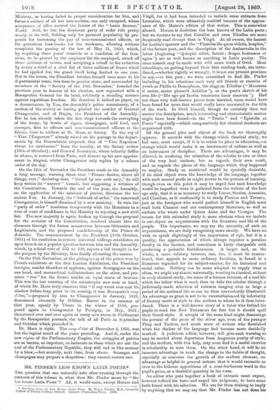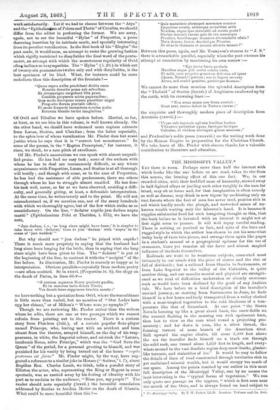MR. PINDER'S LESS KNOWN LATIN POETS.* THE question that one
naturally asks after running through the contents of this volume is, what does Mr. Pinder mean by "the less known Latin Poets "? All, it would seem, except Horace and • Selections from the Less Known Lath, Poets. By North Pinder, KA., formerly 1ellow of Trinity College Oxford Oxford : Clarendon Press. 1869 Virgil, for it had been intended to include some extracts from Lucretius, which were ultimately omitted because of the appear- ance of Mr. Munro's edition of that writer. This is somewhat absurd. Horace is doubtless the best known of the Latin poets ; but we venture to say that Catullus and even Tibullus are more frequently read through than is Virgil. At all events, the lament for Lfssbia's sparrow and the "Phaselus ille quem videtis, haspites," of the former poet, and the description of the Ambarvalia in the latter (beginning " Quisquis adest, faveat ; fruges lastramu.s et agros ") are as well known as anything in Latin poetry. The same remark may be made with still more truth of Ovid. Most schoolboys, on getting beyond their first reading-book, are intro- duced,—whether rightly or wrongly, it is not our present province to say,—to this poet ; we were astonished to find Mr. Pinder including in his selections such very old friends or enemies of youth as Phillis to Demophoon, the elegy on Tibullas (" Memnona si meter, mater ploravit Achillen"), or the poet's sketch of his own life (" Ille ego qui fuerim tenerorum lasor arnorum "). Had not these very well-known pieces been inserted, room would have been found for more that would really have answered to the title of the work. In Ovid himself, though he certainly does not answer the description, much interesting and characteristic matter might have been found—in the " Tristia " and "Epistolm ex Ponto " especially—which comparatively few classical students are acquainted with.
Of the general plan and object of the book we thoroughly approve. It accords with the change which classical study, we feel sure, must accept, if ibis to retain its place in education,—a change which would make it an instrument of culture as well as an instrument of discipline. There are advantages, it may be allowed, in confining the attention of the scholar to two or three of the very best authors, but as regards their own merit, and as regards the phase of the language which they happened to employ. Study so restricted would be specially desirable, if its chief object were the knowledge of the language, together with such mental profit as might accrue in the process of learning, though even on this point it may be urged that such knowledge would be imperfect were it gathered from the writers of the best age only, that it is as necessary to study Lucan, Statius, Ausonius, and Claudian, as it confessedly is to study Plautus and Terence, just as the foreigner who would perfect himself in English must read both Chaucer and our contemporary literature, as well as authors who wrote under Queen Anne and the Georges. The reason for this extended study is more obvious when we include in our object an acquaintance with the literature and life of the people. The importance, we may say the necessity, of such an acquaintance, we are daily recognizing more clearly. We have no wish to speak slightingly of the importance of style, but it is a quality, the appreciation of which always requires a peculiar faculty in the learner, and sometimes is fairly chargeable with producing a pedantic fastidiousness. A larger and, on the whole, a more salutary interest, one, too, it must be remem- bered, that appeals to more ordinary faculties, is found in a literature regarded for its subject-matter, for its historical and social value. Nothing can be more adapted to supply what is often, we might say almost universally, wanting in classical, at least in early classical study, the sense of a human interest, of a real life which lies below what is read, than to take the scholar through a judiciously-made selection of extracts ranging over as large a period of the national life as can be thus conveniently illustrated. An advantage so great is not to be counterbalanced by inferiority of literary merit or style in the authors to whom he is thus intro- duced. There is a well-known story of a tutor who forbad his pupils to read the New Testament for fear lest it should spoil their Greek style. A scruple of the same kind might discourage the perusal of the poets of the silver age, even of the younger Pliny and Tacitus, and much more of writers who flourished when the decline of the language had become more decidedly marked. A judicious edithr, however, will give such warning as may be needed about departures from Augustan purity of style; and the student, with this help, may even find it a useful exercise in scholarship to note them. On the other hand, it will be an immense advantage to mark the change in the habits of thought, especially as concerns the growth of the modern element, an advantage so helpful to general culture that it would reconcile us even to the hideous apparitions of a semi-barbarous word in the pupil's prose, or a doubtful quantity in his verse.
An editor who pats together a book of extracts must expect, however refined his taste and soqnd his judgment, to have some fault found with his selection. We are far from wishing to imply by anything that we may say that Mr. Pinder has not done his
work satisfactorily. Yet if we had to choose between the " Atys" and the "Epithalanajum of Peleus and Thetis" of Catullus, we should differ from the editor in preferring the former. We are sorry, again, not to see the beautiful "Hylas " of Propertius, a poem deserving insertion by its intrinsic merit, and specially interesting from its peculiar versification. In the first book of his "Elegies" the poet made, it would seem, an attempt to resist the growing fashion which rigidly restricted to clisayllables the final word of the penta- meter, an attempt with which the monotonous regularity of Ovid ofte4 inclines us to sympathize. The " Hylas " ( i. 20.) in which out of twenty-six pentameters twelve only end with dissyllables, is the best specimen of its kind. What, for instance could be more melodious than this description of the fountain?—
"Qum supra nudhe pendebant debita carte Roscida desertis poma sub arboribus.
Et circumriguo sumebant lilia prato Candida purpureis mists papaveribns; Qua, modo decerpens thnero pneriliter ungui Proposito florem prastulit officio; Et modo forinosis ineumbens nescius undis Errorem blandis tardat imaginibus."
Of Ovid and Tibullus we have spoken before. Martial, as far, at least, as we see him in this volume, is well known already. On the other hand, we should have welcomed more copious extracts from Lucan, Statius, and Claudian ; from the latter especially, to the splen lour of whose versification Mr. Finder does but scant justice when he says that it is "correct but monotonous." In some of the poems, in the " Raptus Proserpium," for instance, it rises, we think, to a rare pitch of excellence.
Of Mr. Pinder's annotations we can speak with almost unquali- fied praise. He has had no easy task ; some of the authors with whom he has to deal are uncommonly difficult, as any whose acquaintance with Propertius, Liman, and Statius is at all thorough will testify ; and though with some, as in the case of Propertius, he has had the assistance of able predecessors, there are others through whom he has to struggle almost unaided. He has done his task well, never, as far as we have observed, avoiding a diffi- culty, and generally giving, at least, a defensible interpretation.
At the same time, he writes tersely and to the point. He will not misunderstand us, if we mention one, not of the many hundreds with which we thoroughly agree, but of the few which strike us as unsatisfactory. On the line, " dedatur cupido jam dud= nupta mariti" (Epithalamium Pelei et Thetidos, i. 375), we have the note,
"Jam dudum, 1. e., as long since might have been ;' it is simpler to Sake these with 'dedatur,' than to join dudum ' with nupta' in the sense of 'just wedded.'"
But why should not "jam dudum " be joined with cupido ? There is much more propriety in saying that the husband had long since been longing for the bride, than in saying that she long since might have been given to him. The " dedatur" is put at the beginning of the line, to contrast it with the " ae-cipiat " of the line before. In illustration, Mr. Finder is scarcely so happy as in interpretation. Obvious parallels—especially from modern poetry —are often omitted. So in xxxvi. (Propertius iv. 6), the elegy on the death of Pmtus, in lines 66-9 —
"0 centam asquorcas Nereo genitore paellas, Et tu materno theta dolore Thetis, Yes decuit lasso supponere brachia month ;"
we have nothing but a quotation from Ovid, where the resemblance is little more than verbal, but no mention of "Our Ladye bare upp her chinne," or of Milton's " Where were ye nymphs ?"
Though we are reviewing Mr. Finder rather than the writers whom he edits, there are one or two passages which we cannot refrain from pointing out to the reader. There is a curious story from Phsedrus (lviii.), of a certain popular flute-player named Princeps, who, having met with an accident and been absent from the theatre, arrayed hivaself, on the day of his reap- pearance, in white, the Imperial colour, and mistook the "Lmtare, incolumis Roma, salvo Principe," which was the "God Save the Queen" of the period, for a personal greeting to himself, and was punished for his vanity by being turned out of the house "capite
protrusus eat forms." Mr. Pinder might, by the way, have sug- gested a reference to a similar joke in Horace (" Satires," i. 7), about Rupilius Rex. Charles Lamb, we think, tells a parallel story of Elliston the actor, who, representing the King or Regent in some spectacle, was so carried away by his feeling of identity with his part as to exclaim to the audience, "Bless you, my people !" The reader should note especially (lxxvii.) the beautiful consolation addressed by Statius to Atedius Melior on the death of Glaucia. What could be more beautiful than this ?— "Ws matutinos abrumpet murmurs &mum Impositus stratis, abitusque morabitur artis Nexibus, atque ipso revocabit ad osoula poste? Obvins iutranti rursus quis in ora manusque Prosiliet, brevibusque humeros circutudabit ulnis? Muth domus, fateor, desolatique Penates, Et situa in thalami et maesta silentia 13.1011Si8 ?"
Between this poem, again, and Mr. Tennyson's stanzas to "J. S." there is a remarkable parallel, especially when the poet excuses his attempt at consolation by mentioning his own sorrow :- "Ego juxta busta profusis
Matribus aqui) pits cesini solatia natis, Et mihi, cum proprios gemerem defectus ad ignes (Quem, Natura !) patrem ; nee to lugere severus Arceo, sea confer gemitus, pariterque Ream's."
We cannot do more than mention the splendid description from the " Thebaid " of Statius (1xxxvi.) of Amphiarus swallowed up by the earth, with its crowning lines :—
" Non arma mann non frena remisit : Sicut erat, rectos Wert in Tartara currus ;"
the exquisite and thoroughly modern piece of description from Ausonius (cxxvii.) :—
"Utque sub ingenuis agitates fontibus horbao Vibrantes patiuntur aquas, lucetque latetque Calculus, et viridem distinguit glare& museum ;"
and Pruclentius's noble poem (cxxxviii.) on the uniting work done by the Roman Empire in preparation for the Christian Church. We take leave of Mr. Piuder with sincere thanks for a valuable contribution to literature and education.































 Previous page
Previous page